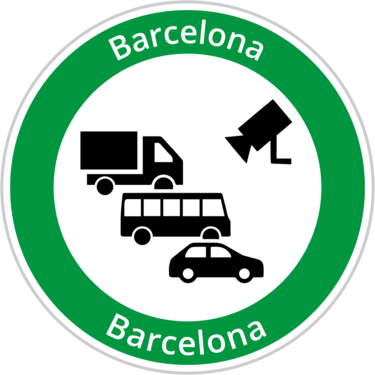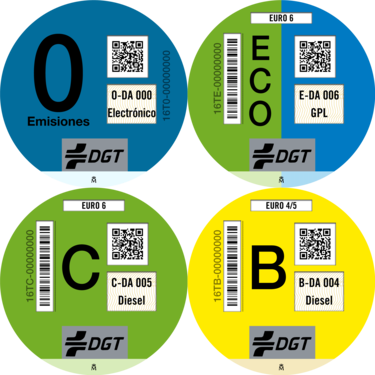Name of the environmental zone: Environmental zone Alicante ZBE Center - Spain
Date of entry into effect of the zone: 01-10-2023
Type of environmental zone: permanently valid, 0:00 - 24:00h
Not allowed to drive (temporarily): Information currently unavailable
Not allowed to drive (permanently): Vehicle class: all
Fuel type: all
Fines: 200 €
Area/extension of the environmental zone: The zone concerns the city center and is bounded by Alfonso El Sabio, Avda. Doctor Gadea and Avda. Federico Soto.
Contact of the environmental zone and exceptions: AYUNTAMIENTO DE ALICANTE
Rathausplatz, 1 03002 Alicante
010/966 900 886
acceso.centrohistorico@alicante.es
zonabajasemisiones@alicante.es
Exemptions: Fire brigade, Police car, Residents (registration/application necessary), Disabled vehicle (registration/application necessary), Patient transport (registration/application necessary), Public bus, Hearse and Ambulance
Name of the environmental zone: Environmental Zone Alicante ZBE Gran Via - Spain
Date of entry into effect of the zone: 01-01-2024
Type of environmental zone: permanently valid, 0:00 - 24:00h
Not allowed to drive (temporarily): Information currently unavailable
Not allowed to drive (permanently): Vehicle class: car, camper (M1), bus (M2, M3), van (N1), truck (N2, N3), motorcycle (L)
Fuel type: diesel, gasoline
Euronorm: 0-3 (diesel), 0-3 (gasoline); M1, N1: 0-2 (gasoline); L: 0-1
Sticker/registration/application: entry only with sticker.
Note: Foreign vehicles do not require a sticker!
Fines: 200 €
Area/extension of the environmental zone: The zone is defined by the Gran Vía and the entire coast and affects all 22 neighborhoods.
Contact of the environmental zone and exceptions: AYUNTAMIENTO DE ALICANTE
Rathausplatz, 1 03002 Alicante
010/966 900 886
acceso.centrohistorico@alicante.es
zonabajasemisiones@alicante.es
Exemptions: Fire brigade, Police car, Residents (registration/application necessary), Disabled vehicle (registration/application necessary), Patient transport (registration/application necessary), Public bus, Taxi and Ambulance
Environmental zone ZBE
Do I need stickers or registrations?
To enter the low emission zone, each vehicle concerned needs either a registration (foreigners) or a Distintivo-Ambiental (Spanish vehicles). Otherwise, a fine of 200 euros to 1800 euros must be expected.
What is a ZBE zone?
The ZBE zones (Zona Baixes Emissions), are fixed zones that can be identified by traffic signs. They are designed to reduce air pollution in Spanish cities quickly and permanently.
A permanent ZBE zone is a zone in which permanent and fixed traffic restrictions apply, such as speed limits and other restrictions, and in which entry is regulated by a system of stickers. Furthermore, in the course of the next few years, stickers may be gradually removed from the system, so that vehicles with these stickers will no longer be able to enter the zones.
How do I recognize the low emission zone?
The beginning and end of the environmental zones are marked with signs. This shows a red circle as a prohibition sign with the remark Zona Baixes Emissions" (low emission zone). In addition, there is also a reference to the Distintivo-Ambiental stickers and which entrances are allowed.
In our Green Zones App we have a detailed map of each low emission zone. So you can easily see the boundaries and avoid penalties.
Are there other low emission zones in France?
Spain has a total of 7 different environmental zones. These differ in ZBE zones, ZEZ zones and ZPA zones: Barcelona, Madrid, Seville, Valladolid, Valencia.
In our Green Zones App we have gathered together all the low emission zones in Europe and presented them clearly.
Good to know...
All current driving bans and further information are available in our Green-Zones App.
Are night-time environmental zones coming?
The Berlin Green Party recently presented a proposal to equalise the traffic congestion in the capital. The idea is to shift delivery and commercial traffic to the night-time hours. According to Antje Kapek, transport spokesperson for the Greens, this proposal should help to ensure that delivery vehicles, refuse collection, care services and doctors get stuck less in congested and parked-up streets during the day. Low-noise and low-emission lorries could increasingly drive into cities at night and on special routes.
Bicycle instead of car - Paris in transition
A study by a public foundation has shown that more than one in ten journeys in Paris and the surrounding area are made by bicycle. This is a remarkable increase compared to 14 years ago, when less than one in thirty journeys were made by bike. Paris seems to have been endeavouring to change its transport policy for years. With more cycle paths and cycle lanes, fewer car parks and higher parking charges, the city is trying to promote cycling and reduce car traffic. But what does this mean for the existing low emission zone?



![[Translate to Englisch:]](https://www.green-zones.eu/fileadmin/_processed_/8/3/csm_screenshot_2024-04-18_125614_c7d9eca4a5.png)
![[Translate to Englisch:]](https://www.green-zones.eu/fileadmin/_processed_/2/0/csm_screenshot_2024-04-18_121908_5e1053efaf.png)